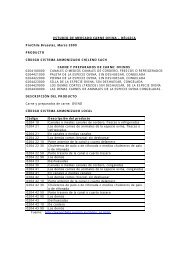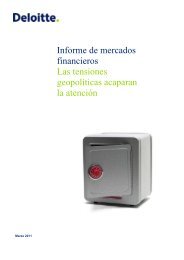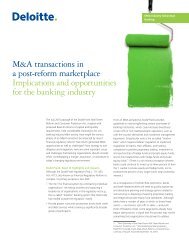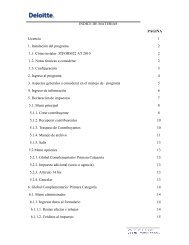Tax Advisers - Deloitte
Tax Advisers - Deloitte
Tax Advisers - Deloitte
You also want an ePaper? Increase the reach of your titles
YUMPU automatically turns print PDFs into web optimized ePapers that Google loves.
Spain<br />
<strong>Tax</strong> reforms keep pace with<br />
economic growth<br />
Ángel Calleja<br />
Garrigues<br />
Madrid<br />
It has been said that you can only successfully reform a tax<br />
system during periods of economic expansion and growth<br />
and that changes implemented during periods of recession<br />
simply come too late. If this is the case, then Spain’s tax<br />
regulators have certainly done their job during the last ten<br />
years.<br />
Over the last decade, Spain’s economy has done extremely<br />
well, outperforming that of its EU partners and growing at<br />
roughly twice their average rate. This prosperity has brought<br />
our economy straight to the front line of the international<br />
business arena, with our multinational enterprises becoming,<br />
for the first time, real actors on the global stage, completing<br />
very significant deals in almost every part of the world.<br />
In the meantime, since 1994, intense behind-the-scenes work by our tax legislators has<br />
been carefully aimed at bringing our tax system into line with, and even beyond, that of<br />
more modernized countries. Thus, for example, the drive towards economic globalization<br />
set to engulf every developed economic system was well anticipated by our lawmakers,<br />
who, among other measures, effectively regulated such tax vehicles as ETVEs – foreignsecurities<br />
holding companies – in a very competitive manner; a highly attractive<br />
exemption method for qualifying foreign-source dividends and gains, where expenses are<br />
deductible regardless of the tax exemption applicable to the main income; an additional<br />
exemption for profits earned by Spanish taxpayers from foreign-operating permanent<br />
establishments; an ambitious and well-targeted expansion of our international tax treaty<br />
network; and a provision enabling the tax deduction of goodwill on certain types of<br />
foreign acquisitions. One could well argue that the main driver behind all these changes<br />
was our legislators’ conviction that, since the times of Columbus, whenever the country<br />
has chosen to finance any form of ambitious major international expedition, a period of<br />
economic growth and prosperity in Spain has followed.<br />
New income tax law<br />
2006 has been no exception to the trend of recent years and tax reforms were once<br />
again on the agenda until, in November, the parliament finally approved highly<br />
significant new tax measures, including a new Personal Income <strong>Tax</strong> Law introducing<br />
a reduction and simplification of the rates, plus rules for a more neutral treatment of<br />
savings income. The new law is effective from January 1 2007.<br />
If we focus our attention on the taxation of corporate profits, the amendments now<br />
approved, set to enter into force in 2007 and beyond, are again of great relevance<br />
since, for the first time ever, they influence essential aspects of the calculation of<br />
corporate income tax, such as the rate and the system of existing tax credits.<br />
In this connection and particularly worthy of note, Spain’s general corporate income<br />
tax has now fallen by five points from 35% to 30% in only two years, while so-called<br />
non-technical tax credits and incentives, mainly aimed at the promotion of certain<br />
activities by Spanish corporations, such as export activities, are suppressed, either<br />
gradually or with immediate effect. The end result of all these measures, engendered<br />
by international competition for tax bases as well as the harmonization measures<br />
implemented to date in Brussels and Luxembourg, should be a more balanced and<br />
competitive tax system, effectively consolidating a framework which is attractive to<br />
both foreign concerns investing in Spain and Spanish entrepreneurs wishing to pursue<br />
a solid expansion of their operations abroad.<br />
Finally, transfer pricing is the undisputed star of this year’s reform. For the first time<br />
ever, relevant changes have been introduced in this field, which had previously merely<br />
adhered to general OECD principles. From January 1 2007, the burden of proof will<br />
202 Guide to the World’s Leading <strong>Tax</strong> <strong>Advisers</strong>

















